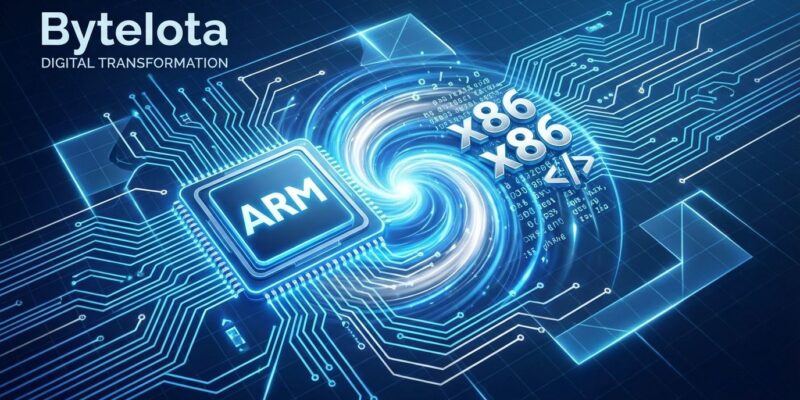
ARM64 Linux users have a persistent problem: the software you need only ships as x86 binaries. FEX-emu, an open-source emulator with nearly 5,000 GitHub stars, solves this by letting you run x86 and x86-64 applications on ARM64 hardware. It works on everything from Raspberry Pi to Snapdragon laptops, and Valve is actively contributing to make Steam gaming possible on ARM.
What FEX-emu Actually Does
FEX-emu is a usermode emulator, not full system virtualization. It translates x86 instructions to ARM64 at runtime using JIT (Just-In-Time) compilation. This approach delivers significantly better performance than interpreted emulation while maintaining broad compatibility.
Unlike solutions that require separate tools for 32-bit and 64-bit binaries, FEX handles both. It also integrates deeply with Wine and Proton, which means you can run Windows x86 games on ARM64 Linux – a feat that seemed impractical just a few years ago.
Why This Matters Now
ARM64 adoption is accelerating across the industry. Apple Silicon normalized ARM desktops. AWS Graviton instances offer better price-performance for cloud workloads. Qualcomm’s Snapdragon X laptops are pushing ARM into the Windows ecosystem. Raspberry Pi remains ubiquitous for hobbyists and edge computing.
The problem? Most desktop software still targets x86. Development tools, games, proprietary applications – the x86 ecosystem is vast. Compatibility layers like FEX-emu bridge this gap, making ARM64 adoption practical rather than theoretical.
Practical Use Cases
Gaming: FEX-emu’s primary focus. Combined with Wine/Proton, you can run Steam and many x86 Linux games on ARM64. Valve’s involvement suggests this isn’t a hobby project – they’re betting on ARM gaming.
Development: Test x86 builds on your ARM64 workstation without maintaining separate hardware. Useful for cross-platform development workflows.
Legacy Software: That critical tool that only ships as x86? It probably works under FEX-emu. Better than maintaining ancient hardware.
Single-Board Computers: Raspberry Pi 4 and 5 users can run software previously restricted to x86 systems. The community has tested everything from productivity apps to retro gaming.
Getting Started
Installation is straightforward on most ARM64 Linux distributions:
# Ubuntu/Debian
sudo add-apt-repository ppa:fex-emu/fex
sudo apt update && sudo apt install fex-emu
# Run any x86 binary
FEXInterpreter ./your_x86_applicationFor gaming, you’ll want to set up Wine integration. The FEX-emu GitHub repository has comprehensive documentation, and the community maintains compatibility lists for popular games.
How It Compares
FEX-emu isn’t the only option. Box64 is a popular alternative with good general compatibility. QEMU’s usermode emulation has been around longer. Apple’s Rosetta 2 is the gold standard on macOS.
FEX-emu differentiates through gaming optimization and unified 32/64-bit support. If you’re primarily interested in running Steam on ARM64 Linux, FEX-emu is the better choice. For general-purpose emulation with maximum compatibility, Box64 might serve you better.
The Caveats
Emulation isn’t perfect. ARM64 and x86 have different memory models – ARM uses weak ordering while x86 guarantees total store ordering. FEX-emu handles this with memory barriers, but some edge cases may behave unexpectedly.
GPU compatibility varies. Games optimized exclusively for NVIDIA or AMD may have issues on ARM GPUs like Qualcomm Adreno. Mesa-based open-source drivers generally work better than proprietary alternatives.
Performance overhead exists. You won’t match native x86 speeds, but JIT compilation makes the gap manageable for most applications.
The Bigger Picture
FEX-emu represents a broader shift. As ARM64 becomes viable for desktop and server workloads, compatibility layers determine whether users can actually make the switch. Valve’s involvement signals that major players see ARM gaming as inevitable, not speculative.
For developers and power users on ARM64 Linux, FEX-emu removes excuses. That x86-only tool you’ve been avoiding? Give it a shot. Check out the FOSDEM 2022 presentation for a deeper technical dive.



